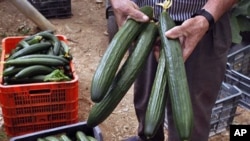While European investigators probe the origin of a deadly E. Coli outbreak, Spanish farmers are angry that their produce has been identified as a possible source - with devastating effects to their livelihood.
Turn on the television in Spain this week and you are likely to see politicians chomping on cucumbers and smiling. They are trying to convince the public - and the rest of Europe - that Spain's agriculture is safe.
But 15 people have died in Germany and one in Sweden from an E. coli outbreak that German officials initially linked to imported Spanish cucumbers. Hundreds of others are sick, in what has become one of the largest E. Coli outbreaks in the world.
Germany, Belgium and Russia have all banned Spanish vegetable imports, pending an investigation. But Spain's agriculture minister accused them of jumping to conclusions too early, without proof of the deadly bacteria's origin. Now, even German officials say they are not so sure.
Spanish farmers fear the damage to their livelihoods is already done, with millions of euros in losses that threaten to destabilize the whole country's already-ailing economy. Vanessa Rossi, an economist at London's Chatham House think tank, says Spain is one of the largest cucumber exporters in the world and, by far, the biggest in Europe.
"Potentially they have something like five percent of GDP (gross domestic product) at risk over these exports, and that's a considerable problem when you're looking at an economy trying to recover," said Rossi.
José María Pozancos is the director-general of the Spanish Federation of Fruit and Vegetable Exporters. He told a local Madrid radio station that his industry's losses could reach 200 million euros a week, if hysteria about Spanish cucumbers continues to spread across Europe.
He says he is very worried and angry and that all the information that has been confirmed, so far, points to a contamination problem in Hamburg, Germany - not with Spanish fruit and vegetables inside Spain.
The European Center for Disease Prevention and Control is still investigating whether that is the case. But, as diplomatic tensions rise, the ECDC refuses to comment on its investigation.
Nevertheless, there is a long chain of growers, packagers, exporters and importers that all work to put foreign produce on local supermarket shelves. Investigators are likely probing each and every link between cucumber farms in Spain's southern Andalusia region and supermarkets in northern Germany.
Outbreaks of disease in food have the potential to wreak havoc on economies worldwide. Thailand lost billions of dollars in chicken exports when avian flu spread through the country in 2004. British beef has also been banned from the rest of Europe, at various times, during outbreaks of mad cow disease there. Spanish leaders want to avoid that same fate, and some are calling for compensation.
Rossi says the idea of compensating farmers for lost revenue is something European leaders in Brussels might have to scramble to address.
"In these circumstances, I don't know that there is any particularly policy from the agricultural fund in Brussels to be able to make compensation. I don't think there's a normal expectation that these kinds of issues arise, so I'm not sure what they have for a crisis mechanism,” she said. “ Possibly there could be some aid given. Or the Spanish government would have to promise aid, but, of course, that would be extremely costly, if they have to put that on their fiscal deficit when they're already struggling with high debt."
Governments are still waiting for definitive word on the E. Coli outbreak's source. Meanwhile, the first suspected domestic case of the disease has now surfaced northern Spain - a 40-year-old man who had recently traveled to Germany.




